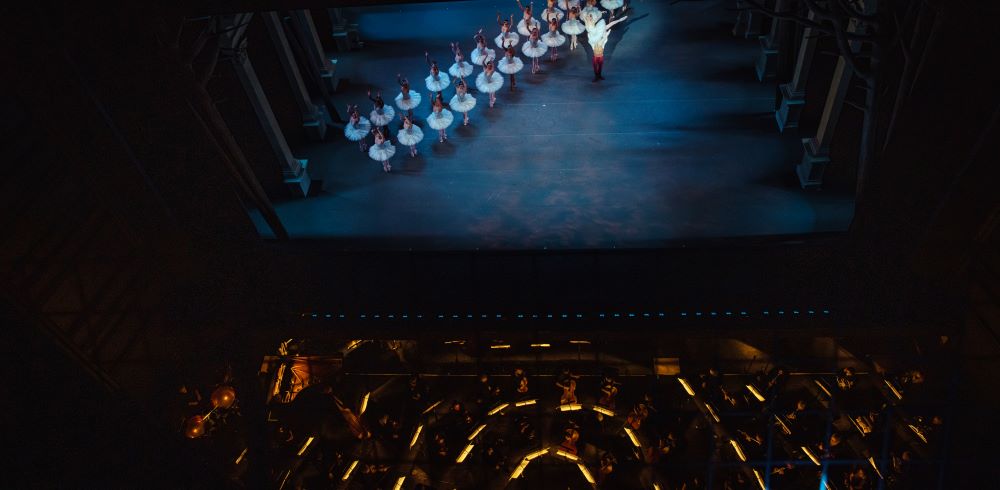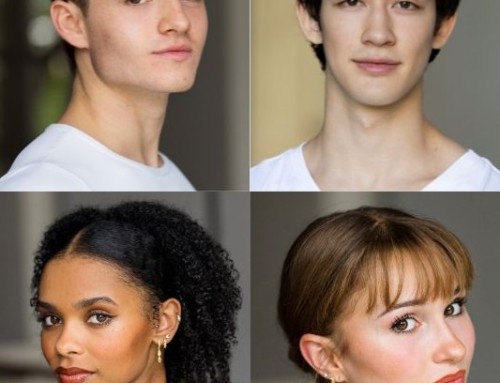Dan Williams, PNB’s Principal Oboist, on Swan Lake
Tchaikovsky’s first ballet score, Swan Lake, was commissioned in 1875. Tchaikovsky, who is widely considered to be the foremost ballet composer, utilized his keen orchestration skills in this ballet to create a score characterized by bold gestures and dramatic expressivity. The first notes of this enduring score are played by the oboe. The instrument features prominently throughout the ballet; in fact, those first five notes are inverted to begin the Swan Lake theme. Today on the blog, we sit down with PNB’s Principal Oboist Dan Williams to learn more about his perspective on Swan Lake, PNB’s Orchestra, and playing the oboe!

The oboe is the very first instrument we hear in Swan Lake and is a major part of the main theme. Does this make it one of your favorite ballets?
“I always look forward to playing Swan Lake; so many expansive melodies are given to the oboe, and they show the oboe at its best! Personally, I really get to pour out all my emotions through many of these solos, and due to their frequency in this ballet, I’m pretty drained by the end!”
You’ve played in PNB’s Orchestra for many years, and have performed in other groups like the Seattle Symphony. What are the differences between performing in a ballet orchestra versus a traditional symphony orchestra?
“The one difference I sense for sure is the repetition. A symphony program, at most, you perform three times in a run. On the other hand, at the ballet, we are performing it eight to ten times in a relatively short span of time. Full-length ballets, in such a condensed time frame, tend to eat away at the reed supply, so I have to turn out quite a few more reeds in preparation for the run.”
How did you originally become interested in playing the oboe?
“The first time I heard the oboe was from a recording of Beethoven’s 5th Symphony that my mom brought home; she redeemed store coupons for it in the 1960s (that was a thing..!). There is an oboe cadenza in the 1st movement, and I was captivated. When I started music in school, I actually played the clarinet and continued that all the way through high school. The whole time, I was intrigued and lured to the sound of the oboe. I asked my junior high school band director if I could play the oboe, and he said it wasn’t the right time. Finally, when I was a senior in high school, I checked out the Redmond High School’s oboe from the band room, and it was a great fit!”
Listen to iconic moments for Tchaikovsky’s score and more on this PNB playlist:
As an orchestral player, have you changed the ways you practice as you’ve progressed in your career?
“Oh, yes! Through all the years of playing your technique builds and builds. Of course, you need to keep that level up, but so many things come much more easily because of it. Now my practice time is all about efficiency! Getting the most done in the least amount of time.”
In addition to performing, you’re also a professor. How has your teaching practice influenced your performance practice?
“It has brought a more efficient approach to practicing and preparing for a performance. Truly, you must practice what you preach!”
With all your years in the PNB pit, you’ve got to have some great stories. What’s one of your favorite PNB memories?
“This pertains to PNB and playing in a pit; I had just won a Principal Oboe position in the Honolulu Symphony, and one of the weeks, PNB was actually touring and doing Swan Lake! At one of the performances I was playing the opening solo in the second act, and could hear the audience start to giggle, and then laugh. It turns out one of the [prop] swans flying across the stage got stuck on the cable, and would not move. The stage crew was shaking the cable to try to get the swan back in motion, but it ended up falling off the cable onto the stage! The unfortunate part of playing in the pit is that we rarely get to see what is happening on the stage, but I could tell something was amiss by the look on the Conductor’s face!”

Dan Williams is one of Seattle’s most sought-after performers, as soloist, orchestral musician, teacher, and recording artist. He is the principal oboist of the Pacific Northwest Ballet Orchestra and has also served as principal oboist of the Honolulu Symphony Orchestra. He held the same positions in the Harrisburg (PA) and Binghamton (NY) Symphonies. He has also played principal oboe with the Seattle Symphony and the Seattle Opera. Of his 1996 performance of Bach’s Double Concerto with Joseph Silverstein and the Northwest Chamber Orchestra, The Seattle Times reported that “oboist Dan Williams poured out waves of beautiful tone with considerable musicality.” In a 1999 review of the Vaughan-Williams Oboe concerto, the Bellingham Herald described Williams as “a consummate player, in easy command of those subtle shades of color and phrase that can let the oboe approach the expressive range of the human voice. It was a performance to melt your heart.” Mr. Williams currently teaches oboe at the University of Puget Sound and has served on the faculties of Western Washington University and the University of Washington School of Music. A native of Seattle, Dan Williams received his musical training at the Juilliard School and at Western Washington University, where he was voted Most Outstanding Graduate by the music faculty.
PNB’s latest production of Swan Lake runs February 2nd – 11th, 2024. Purchase tickets here or by calling the Box Office at 206-441-2424.
Answers edited for clarity.
Photo credits: PNB Company dancers and Orchestra performing Kent Stowell’s Swan Lake, photo © Lindsay Thomas. Swan Lake props backstage, photo © Lindsay Thomas. Dan Williams, photo used with permission. PNB Orchestra, photo © Angela Sterling. Dan Williams, Selina Greso, and Tad Margelli, colleagues and fellow students of John Ferrillo, photo used with permission.





